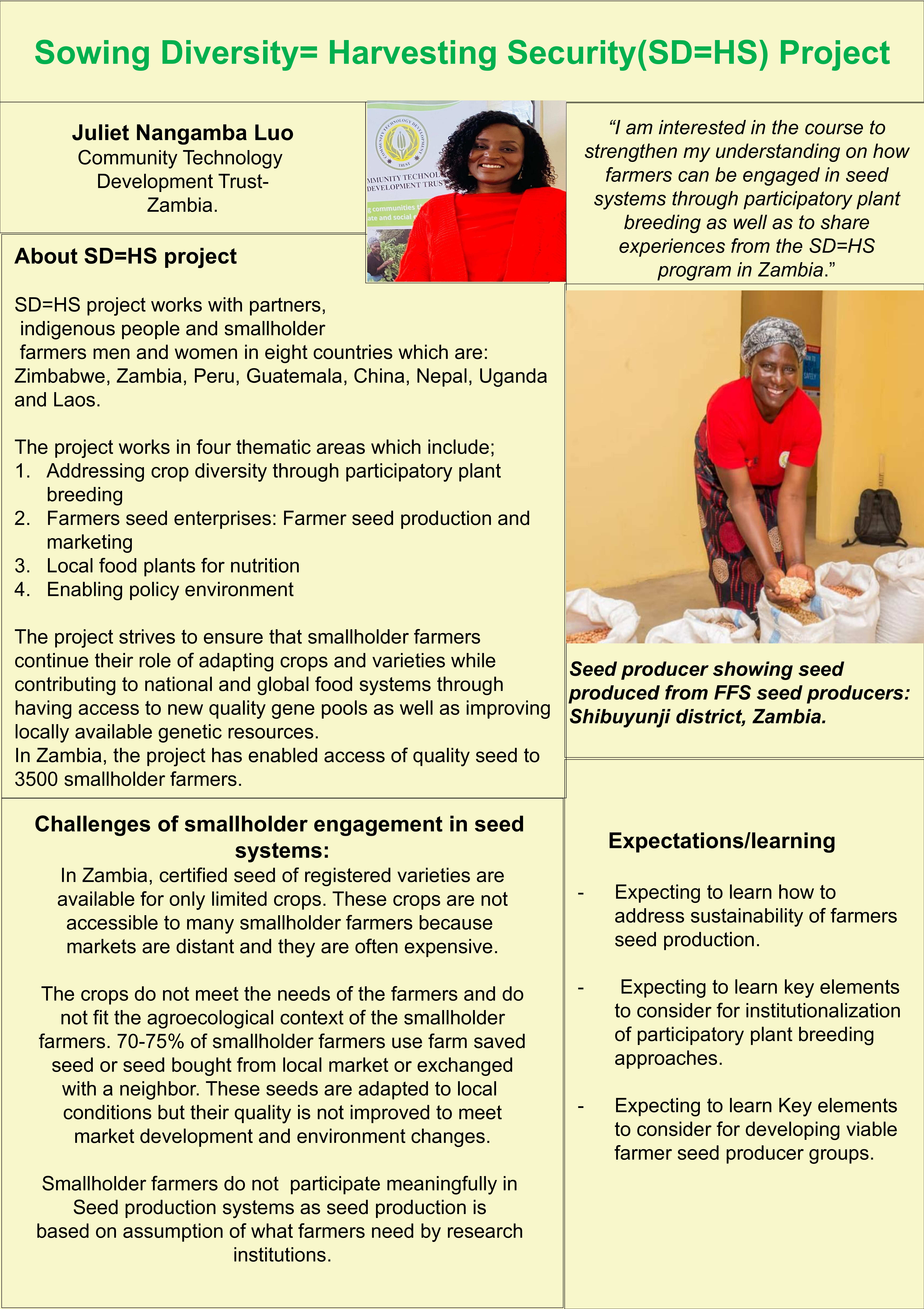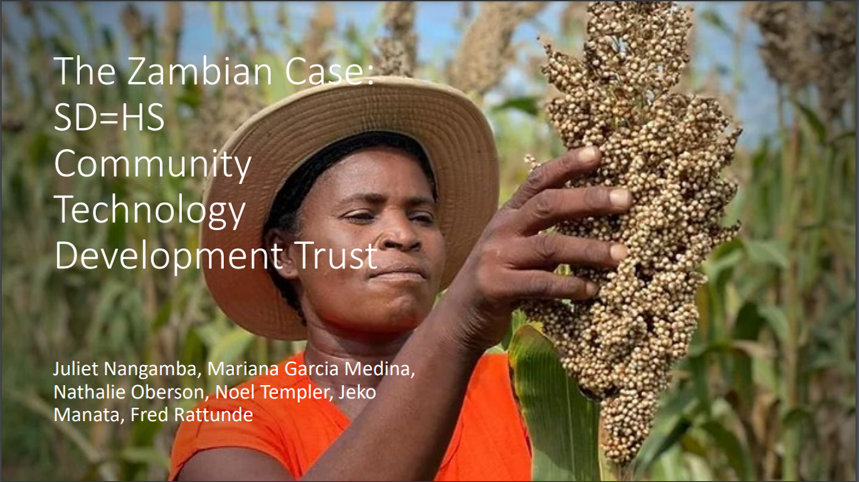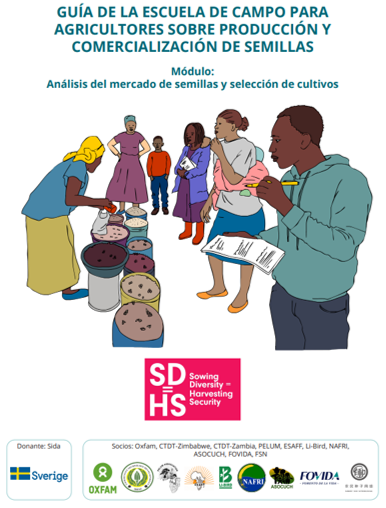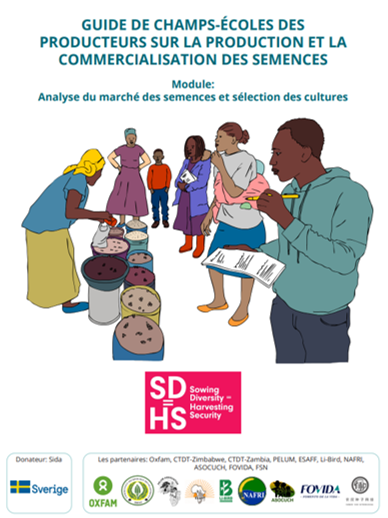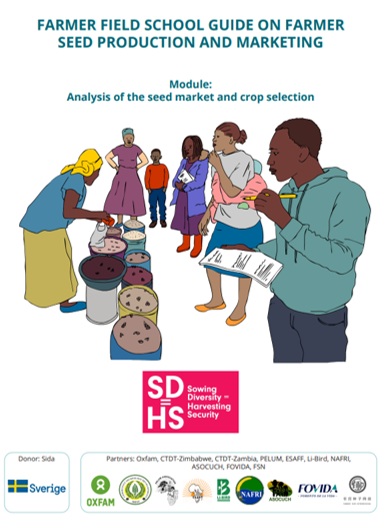“It is fascinating to make the connections between climate change, seeds systems, food systems, livelihoods, women, land, and indigenous knowledge surrounding seeds, and how they impact aspects of culture, traditions and life.”
Juliet Nangamba works as a programmes manager with Community Technology Development Trust (CTDT) Zambia. She focuses on seed and food systems projects and has worked with rural communities to improve people’s livelihoods with special focus on food, seed, and nutrition security. Together with six colleagues from Sowing Diversity=Harvesting Security, Juliet presented a case from Zambia to the participants of the Smallholder Engagement in Seed Systems course.
The course was developed by Wageningen University & Research, the Norwegian University of Life Sciences, the Production Ecology & Resource Conservation and Oxfam Novib through the Sowing Diversity=Harvesting Security program (SD=HS). The unique feature was a mix of academics and practitioners.
“We do not only work on conservation of plant genetic resources, but we look at food and nutrition as well as how to manage biodiversity, and how these contribute to livelihoods and climate change.”
Since she watched a documentary about climate change as a child, Juliet developed a passion to work on solutions to face this crisis. Juliet Nangamba was trained in agronomy and crop science with a very conventional way of looking at agriculture. She joined CTDT Zambia after university, in 2012. She quickly realized the importance of the work being done around seed systems and has been passionate about it ever since. In Zambia, and worldwide, there were very few organizations working on this issue, and fundraising remains a challenge. However, the call for seed systems is gradually increasing, and more donors and organizations are beginning to understand the significance of this work.

“We can do more as women, we need to claim our spaces, everywhere. In the political space, manufacturing, agriculture we can contribute in different ways and inspire many other women out there.”
Women are still underrepresented in the field of agriculture, but this does not deter Nangamba from making a positive impact. She believes that women can contribute to agriculture in many ways and can inspire other women in the process. Juliet honestly shared how she felt intimidated when she first started working with communities, but soon realized that she had inspired other women and provided them with proof that they can take leadership roles in the community.
“Sharing our work with researchers whose perception of seed systems is often about economic gains, yields and things you can measure, gave me a platform to show a different perspective.”
The CTDT programmes manager developed a case from Zambia (download it below), which focused on bringing farmers to the center of the seed systems approach. The case invited participants to take in the broader context of seed systems and how it fits into the food system. The discussions in the course led to an agreement that seed systems should be viewed beyond what is perceived as a functioning seed system, this came from the real-life cases presented, which cannot be ignored.
“I hope that the scientists will look beyond to the broader context of what a seed system should deliver and remember that seed systems are embedded in so much complexity. I hope the context of complexity beyond linear thinking is the message I leave with them.”
Nangamba leaves feeling empowered by the input received from academics on the case from Zambia. She appreciated the critical thinking and exchange of knowledge, and feels that the practitioners managed to deliver their message.
“A lot more people need to understand the importance of farmers’ seed systems. We need to work on bringing more people in, we are too few still.”
Thanks to Juliet for bringing different perspectives into the classroom and sharing her point of view as a woman in agriculture. It is inspiring how during this week, Juliet and other presenters mapped out very clearly the function of farmers’ managed seed system and how they interact with culture, tradition, spirituality, and the identity of people. Hopefully, discussions and agreements made in the course will help inspire more people to understand the importance of seed systems.
